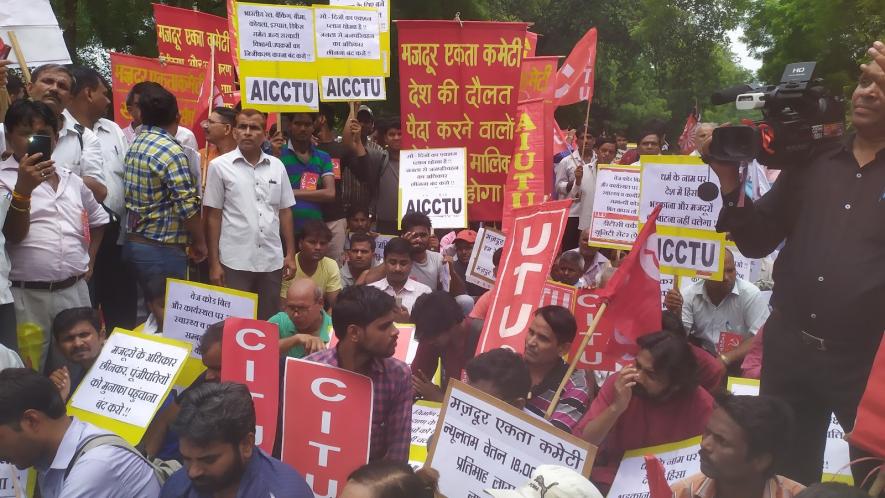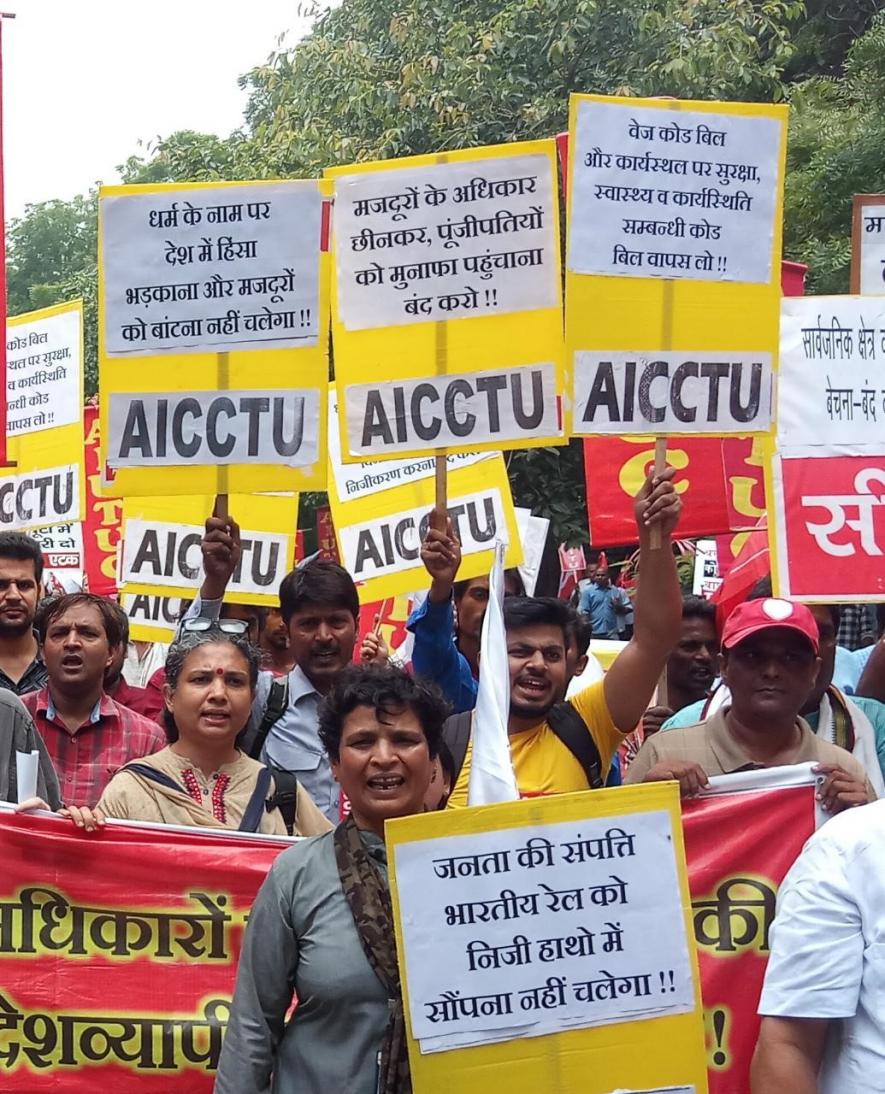Central TUs Protest Against Codification of Labour Laws

“If there aren’t laws for us, then who will protect us?,” asked Shiv Kumar, a construction factory worker, who was one among many others who were fired from their job, after staging protests following the death of their co-workers in a Delhi-based factory. Many like Shiv Kumar took to streets today (August 2) across India to lodge their protest against Modi government’s push to amalgamate 44 labour laws into four codes. The workers and the unions have stressed that the proposed changes are oriented towards benefiting owners of the factories, making it easier for them to repress workers’ movements and curtail their rights.
The all India call for protest was given by ten central trade unions that included, Centre of Indian Trade Unions (CITU), All India Trade Union Congress (AITUC), All India Central Council of Trade Unions (AICCTU), Indian National Trade Union Congress (INTUC), All India United Trade Union Centre (AIUTUC), Hind Mazdoor Sabha (HMS), Trade Union Coordination Centre (TUCC), Self Employed Women’s Association (SEWA), Labour Progressive Front (LPF) and United Trade Union Congress (UTUC). The call for the protests was given after the Modi government, on Tuesday, July 23, tabled the Code on Wage Bill, 2019, and Code on Occupational, Safety, Health and Working Conditions Bill, 2019, (OSH Code) in the Lok Sabha. Both bills seek to subsume 17 central laws in total, with the wage code seeking to replace the existing laws relating to workers’ remuneration and the OSH code curtailing the rights of workers in securing better working conditions.

Speaking at the protest in Delhi, Amarjeet Kaur, general secretary of AITUC, said, “The Bharatiya Janata Party is trying to quash all labour laws and arbitrarily pass the wage code bills without a dialogue with the unions. The parliament session has now been extended to hurriedly pass the occupational health and safety code and the wage code. The finance minister has explicitly stated that the 44 central labour laws will be converted into four codes. This is not about the interests of the workers but of the factory owners and the big corporations.”
Also read: 'Proposed Labour Codes Will Further Destroy Workers’ Rights’
Opposing the Narendra Modi led government’s move to get the proposed labour codes enacted by Parliament, several trade union leaders and labour rights activists said it would ruin the entire labour law architecture in the country and squeeze trade unions out of existence. With the passing of the Code on Wages in Lok Sabha on July 30, 2019, the dismantling of existing protective framework for workers has begun. Three essential features of wages are being changed through the newly passed Code on Wages (CW). These are: how the minimum wage will be calculated, what will be a working day and by what means will the law be enforced. Taken together, these changes effectively destroy the protective nature of labour laws relating to wages.
Additionally, the CW doesn’t acknowledge the well-settled principles of calculating minimum wages – based on per capita food intake of at least 2,700 calories for a worker’s family comprising three units (2 adults and 2 children) – unanimously adopted by the 15th Indian Labour Conference (ILC). What’s more, on July 10, the government announced the new floor level minimum wage to be ₹ 178 per day which is mere ₹ 2 more than what was declared in the last two years. CITU, in a press statement, has condemned this “shameless” declaration of the new floor level minimum wage, which goes against the government’s own Expert Committee recommendation of ₹ 375 per day.
The code also cracks down on the workers’ right to organisation and reducing the collective bargaining power of the unions to fight for the interests of the workers.
“The BJP government is showing its true colours by asking the capitalist class to extract resources and by subverting all laws pertaining to labour rights,” AR Sindhu, national secretary of CITU said. She added, “The basic intention is to take away the rights of the workers, in an extremely cunning way. The government is trying to shun the issue in a debate between organised and unorganised sectors of the workers. Smaller changes are being made to many criteria for definition of minimum wage.”
Also read: Labour Codes: Central Trade Unions Call for Nationwide Protest on August 2
The protesting workers argue that as workers in a factory, after having endured all forms of oppression, their last resort is to protest if factory owners fire them and harass them. However, with the new changes of the Modi government even that minimum right is being taken away. The spirit behind the earlier laws was that workers are disadvantaged sections who are socially and economically unable to counteract the pressure of exploitation from employers and hence they need protective legislations. The new logic, enshrined by the Modi government in the new codes, is that such protection should be abandoned and a free hand should be given to employers to extract the maximum labour out of hapless workers with minimum compensation.
There were several protests across India – a rally was taken out in Patna and in Haryana, the workers staged multiple demonstrations. The issue was also echoed in Parliament today as left parties voiced their dissent on the proposed changes to the labour laws. The central trade unions are also planning on holding strategy meetings across the country and are likely to announce a general strike soon.
Get the latest reports & analysis with people's perspective on Protests, movements & deep analytical videos, discussions of the current affairs in your Telegram app. Subscribe to NewsClick's Telegram channel & get Real-Time updates on stories, as they get published on our website.
























